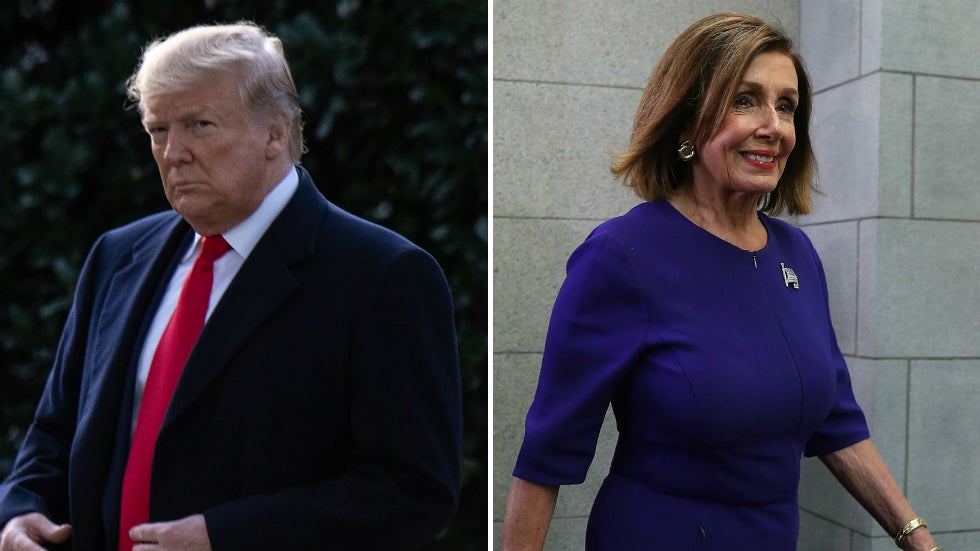By: Olivia Beavers & Mike Lillis – thehill.com – January 12, 2020
Speaker Nancy Pelosi (D-Calif.) on Friday ended weeks of speculation surrounding the Democrats’ impeachment effort, announcing the House would vote as early as next week to send a pair of articles to the Senate.
The move is indication that the Speaker, who’d delayed the transmission of the articles in an effort to win procedural concessions from Senate GOP leaders, is ready to launch the trial in the upper chamber despite Senate Majority Leader Mitch McConnell‘s (R-Ky.) refusal to accept her demands.
Yet there are plenty of lingering questions about how the esoteric process will unfold over the next several weeks, as both sides vie for an upper hand in the high-stakes debate over the propriety of President Trump’s handling of foreign policy in Ukraine.
Here are five outstanding questions as the articles move from the House to the Senate.
When, exactly, will the trial begin?
While Pelosi on Friday expressed a new willingness to send the Senate the two impeachment resolutions — one charging Trump with abuse of power, the other with obstruction of Congress — she stopped short of scheduling a vote to do so.
Instead, she said she’s “asked Judiciary Committee Chairman Jerry Nadler (D-N.Y.) to be prepared to bring” a procedural measure to the floor “next week” to designate the still unnamed impeachment managers and dispatch the articles to the upper chamber. That resolution could technically be passed in a flash, by unanimous consent, but House Republicans are expected to force a more formal roll-call vote to highlight support from vulnerable Democrats.
Before the decision to vote is finalized, Pelosi said she’ll seek input from rank-and-file Democrats “on how we proceed further” — a meeting of the caucus that’s scheduled for Tuesday morning in the Capitol.
That consultation is largely a formality, as Democrats have been virtually unanimous in supporting Pelosi’s top-down impeachment strategy since the process launched in September. And their expected approval sets the stage for a floor vote as soon Tuesday, launching the Senate trial as early as Wednesday.
Still, no vote has been scheduled — and likely won’t be until after Tuesday’s meeting.
What will rules shaping the trial will look like?
Pelosi’s decision to send the articles to the Senate next week came after tussling with McConnell over what the rules shaping the trial will be.
Pelosi withheld sending the articles of impeachment to the Senate to try to win concessions with McConnell on the trial’s rules, but ultimately signaled Friday she would relent.
McConnell has said that he will follow the standard from President Clinton’s 1999 impeachment trial, in which the Senate first votes on the resolution laying out the trial and then later on a second resolution on calling in witnesses — something the GOP leader has made clear he does not want to do.
Pelosi has said she wants to see the resolution shaping the rules for the Senate trial before finalizing her team, with sources saying this will likely factor into her decision to pick members with more prosecutorial experience, or those with more constitutional and appellate experience.
Senate rules require lawmakers in the upper chamber to participate in presidential impeachment trials, meaning they won’t be able to skip the trial for the trail, particularly in Iowa where voters will be caucusing in just weeks.
The 1999 impeachment trial resolution gave the House managers a maximum of 24 hours to make their case. The president and his defense team were then granted the same window to respond to the charges. Afterward, senators were permitted to question the parties “for a period of time not to exceed 16 hours.”
After that initial phase, each side under the 1999 rules was allowed “to make a motion to subpoena witnesses and/or to present any evidence not in the record,” which was then subject to a full Senate vote.
During the Clinton trial, the Senate voted on a second resolution along party lines to subpoena three witnesses for closed-door depositions, all of whom had previously testified in the initial investigation.
How did the delay affect the process politically?
[…]
To see the remainder of this article and others from The Hill, click read more.
Source: Five lingering questions as impeachment heads to Senate | TheHill
 Listen Online
Listen Online Watch Online
Watch Online Find a Station in Your Area
Find a Station in Your Area










 Listen Now
Listen Now Watch Online
Watch Online
